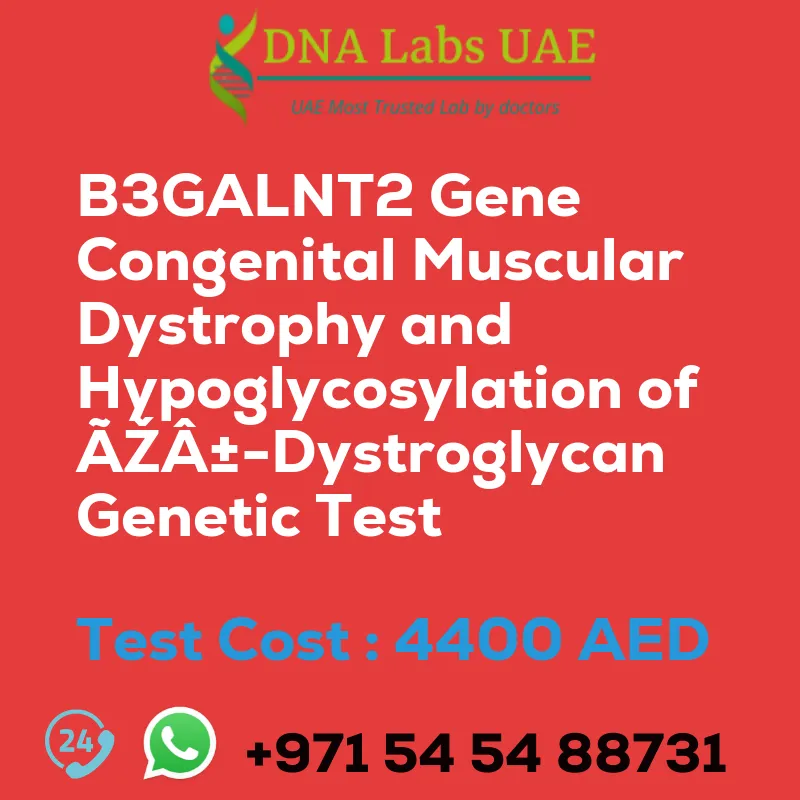B3GALNT2 Gene Congenital Muscular Dystrophy and Hypoglycosylation of Dystroglycan Genetic Test
Genetic testing plays a crucial role in diagnosing and understanding various genetic disorders. In this blog, we will discuss the B3GALNT2 gene, which is associated with a form of congenital muscular dystrophy (CMD) known as MDDGA10.
What is MDDGA10?
MDDGA10 is a type of congenital muscular dystrophy characterized by muscle weakness and wasting that is present at birth or develops within the first few months of life. Individuals with MDDGA10 may also experience delayed motor development, difficulty with walking, and joint contractures. One of the key features of MDDGA10 is hypoglycosylation of α-dystroglycan, a protein that is crucial for maintaining the structural integrity of muscle tissue.
The Role of B3GALNT2 Gene
The B3GALNT2 gene is associated with MDDGA10. Hypoglycosylation refers to a deficiency in the addition of sugar molecules to α-dystroglycan, which impairs its ability to interact with other proteins and maintain muscle function. Genetic testing using Next-Generation Sequencing (NGS) technology can identify mutations in the B3GALNT2 gene that cause MDDGA10.
The Genetic Test
The B3GALNT2 Gene Congenital Muscular Dystrophy and Hypoglycosylation of α-Dystroglycan Genetic Test is a valuable tool in diagnosing MDDGA10. The test is performed using NGS technology, which involves sequencing the entire B3GALNT2 gene to identify any changes in the DNA sequence that may be responsible for the condition.
Test Components and Price
The cost of the B3GALNT2 Gene Congenital Muscular Dystrophy and Hypoglycosylation of α-Dystroglycan Genetic Test is AED 4400.0. The test can be conducted using a blood sample, extracted DNA, or one drop of blood on an FTA card. The results of the test are typically delivered within 3 to 4 weeks.
Test Type and Department
The B3GALNT2 Gene Congenital Muscular Dystrophy and Hypoglycosylation of α-Dystroglycan Genetic Test falls under the category of neurological disorders. The test is conducted by the Genetics department of our DNA Labs UAE.
Pre-Test Information
Prior to undergoing the B3GALNT2 Gene Congenital Muscular Dystrophy and Hypoglycosylation of α-Dystroglycan Genetic Test, it is essential to provide the clinical history of the patient. Additionally, a genetic counseling session may be conducted to draw a pedigree chart of family members affected by B3GALNT2 Gene Congenital Muscular Dystrophy and Hypoglycosylation of α-Dystroglycan.
Genetic testing is a powerful tool in understanding and diagnosing genetic disorders. The B3GALNT2 Gene Congenital Muscular Dystrophy and Hypoglycosylation of α-Dystroglycan Genetic Test can provide valuable insights into MDDGA10 and help individuals receive appropriate treatment and support. If you suspect you or a loved one may have MDDGA10, consult a neurologist and consider undergoing this genetic test.
| Test Name | B3GALNT2 Gene Congenital muscular dystrophy and hypoglycosylation of α-dystroglycan Genetic Test |
|---|---|
| Components | |
| Price | 4400.0 AED |
| Sample Condition | Blood or Extracted DNA or One drop Blood on FTA Card o |
| Report Delivery | 3 to 4 Weeks |
| Method | NGS Technology |
| Test type | Neurological Disorders |
| Doctor | Neurologist |
| Test Department: | Genetics |
| Pre Test Information | Clinical History of Patient who is going for B3GALNT2 Gene Congenital muscular dystrophy and hypoglycosylation of -dystroglycan NGS Genetic DNA Test A Genetic Counselling session to draw a pedigree chart of family members affected with B3GALNT2 Gene Congenital muscular dystrophy and hypoglycosylation of -dystroglycan |
| Test Details | The B3GALNT2 gene is associated with a form of congenital muscular dystrophy (CMD) known as MDDGA10. This condition is characterized by muscle weakness and wasting that is present at birth or develops within the first few months of life. Individuals with MDDGA10 may also have delayed motor development, difficulty with walking, and joint contractures. One of the key features of MDDGA10 is hypoglycosylation of -dystroglycan, a protein that is important for maintaining the structural integrity of muscle tissue. Hypoglycosylation refers to a deficiency in the addition of sugar molecules to -dystroglycan, which impairs its ability to interact with other proteins and maintain muscle function. NGS genetic testing can be used to identify mutations in the B3GALNT2 gene that cause MDDGA10. This type of testing involves sequencing the entire gene to look for changes in the DNA sequence that may be responsible for the condition. NGS testing can be performed on a blood or saliva sample and can provide a definitive diagnosis in individuals suspected of having MDDGA10. |







